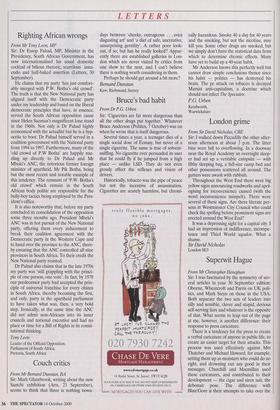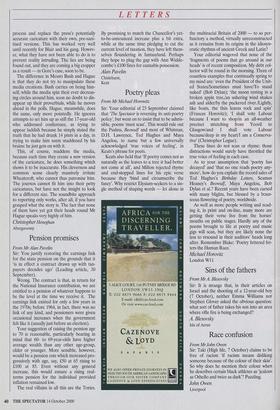Superwit Hague
From Mr Christopher Heneghan Sir: I was fascinated by the symmetry of sev- eral articles in your 30 September edition: Oborne, Wheatcroft and Parris on UK poli- tics, and Mark Steyn on those in the USA. Both separate the two sets of leaders into silly and sensible, clever and stupid, devious self-serving liars and whatever is the opposite of that. What seems to leap out of the page at me, however, is another difference: their response to press caricature.
There is a tendency for the press to create a verbal caricature of anyone in public life, to create an easier target for their attacks. This process was used effectively against Mrs Thatcher and Michael Howard, for example, setting them up as monsters who could do no right, and drowning out any good in their messages. Churchill and Macmillan used these caricatures, and contributed to their development — the cigar and siren suit, the debonair pose. The difference with Blair/Gore is their attempts to take over the
LETTERS
process and replace the press's potentially accurate caricature with their own, pre-sani- tised versions. This has worked very well until recently for Blair and his gang. Howev- er, what they have not been able to do is to prevent reality intruding. The lies are being found out, and they are coming a big cropper as a result — in Gore's case, soon to be.
The difference in Messrs Bush and Hague is that they do not try to manipulate these media creations. Bush carries on being him- self, while the media spin their ever decreas- ing circles around him, soon no doubt to dis- appear up their proverbials, while he moves ahead in the polls. Hague, meanwhile, does the same, only more pointedly. He ignores attempts to set him up as still the 17-year-old who addressed conference, as trying to appear laddish because he simply stated the truth that he had drunk 14 pints in a day, in trying to make him seem maddened by his brains: he just gets on with it.
This, of course, maddens the media, because each time they create a new version of the caricature, he does something which shows it to be inaccurate. His cleverness and common sense clearly massively irritate Wheatcroft, who cannot thus patronise him. The journos cannot fit him into their petty caricatures, but have not the insight to look for a different size. The soundbite approach to reporting only works, after all, if you have grasped what the story is. The fact that none of them have yet got their heads round Mr Hague speaks very highly of him.
Christopher Heneghan
Abergavenny



















































































 Previous page
Previous page